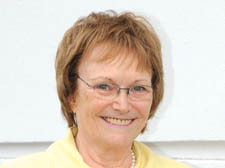|
|
 |
| |

Dame Elizabeth Hoodless |
Government must volunteer funds to support vital helpers
Volunteers are an increasingly critical lifeline for the vulnerable – and save us millions every year, writes Dame Elisabeth Hoodless
• An incredible £174 million could be cut from the costs of caring in England if the government helped citizen volunteers to support the 500,000 older isolated people in their own homes.
Naturally, most older people prefer their own homes to institutional care. Research commissioned by Community Service Volunteers (CSV), Help the Aged and the British Red Cross reveals that older people prefer volunteers to support them rather than paid staff. Unlike most paid staff, volunteers have time and flexibility to talk and share.
The time has come for government to recognise that services provided by volunteers, far from being second class, are our best hope for a better life for citizens and certainly offer best value.
Across London CSV is already sending volunteers into the homes of isolated older people to improve their lives.
In neighbouring Camden, CSV’s retired and senior volunteers are behind “networking” projects designed to improve the health and well-being of disabled and house-bound people.
The volunteers use telephones to do one-to-one support of housebound and isolated people – helping to reduce stress by providing emotional and practical information support for those affected.
Healthcare for the elderly is not the only sector that could be transformed through volunteering.
Volunteers already add value to schools, prisons, crime prevention and social services.
Volunteers reduce re-offending, transform the lives of mental health service users and work powerfully with the families of children “at risk”, but the resource they offer is largely untapped.
The first-ever volunteers in child protection, in Bromley and in Sunderland, have been helping to prove initial sceptics wrong. They have worked alongside social service professionals, helping more than 50 families. Their regular support and practical help have led to more than two-thirds of the families coming off the “at risk” register. This is a model that could benefit Islington families too.
Independent evaluation by Professor Jane Tunstill, of King’s College London, reveals extraordinary examples of children returning to school after long absences, of fridges removed from back gardens and shelves fixed, of mothers enabled to overcome depression and access training to become classroom assistants.
Most striking has been the confidence that the volunteers have built up to enable parents to engage with the system: how to be honest with social workers without losing their temper; securing places at chosen schools; and how to cope with the three or more officials calling at their home. While initially hesitant, social workers now view the volunteers’ contributions as a positive resource supporting their work.
CSV also provides “Allies” for young people in the care of Islington Council. Some of the children have lost all contact with their family and have no special adult in their life who can spend time with them. Volunteer “Allies” act as friends, informal mentors, advisors and role models. They spend a few hours each week with a looked-after child or young person, taking them out, talking to them, introducing them to new activities and having fun.
At the time when I was on Islington Council (1964-68) our full-time volunteers worked in social work area teams in residential homes for children and in primary schools.
Their energy and commitment were treasured and many went on to train as teachers and social workers, like Kate Mabey who now runs HomeStart.
Sadly, these examples of opening doors to volunteer involvement in care services are the exception and not the rule. We need to ask: what are the next steps to ensure that volunteers become part of the DNA of our public services?
Every department of state, health and social care, education, justice, communities and local government should develop a strategy to involve citizens in its work. As Barack Obama’s campaign manager put it: “Don’t just talk at people, give them something useful to do.” Training for doctors, nurses, social workers, teachers, police officers and more should include how to harness citizens’ energy in their work.
Successive governments have affirmed the value of volunteers in service delivery and as strengtheners of civil society and builders of social capital. Were volunteers to go on strike, the nation would be in crisis as frail older people, mental health service users, children at risk and many people with disabilities would lose their critical support. The value of volunteer engagement exceeds £40 billion a year.
However, there are modest costs, recruiting, screening, matching, supporting and recognising volunteers. When national and local services need to secure “best value” in the delivery of public services it is time that government, nationally and locally, accepted responsibility for these costs so that volunteer organisers can focus their energy and skills on involving citizens; not endlessly fundraising to help it happen.
•
|
 |
|
| |
| Your Comments : |
| |
| |
| |
|
 |
|